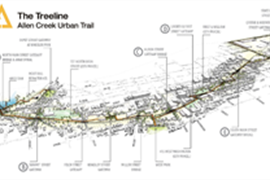Overview
The Treeline Master Plan proposes an urban trail that will provide safe, non-motorized travel to many of Ann Arbor's cultural and recreational sites and connect with the county-wide Border-to-Border (B2B) Trail and the state-wide Iron Belle Trail.
Status
The city is working with the
Treeline Conservancy (formerly Allen Creek Greenway Conservancy) and others to move the Plan and coordinating projects towards realization. To help ensure the project moves forward as a cooperative effort, on February 19, 2019 City Council approved to engage in a
Collaborative Agreement with the Treeline Conservancy.

Through a Washtenaw County Parks and Recreation Connecting Community grant, the city and the Treeline Conservancy engaged in an Alignment Study to understand the feasibility of potential routes from Argo Pond to 721 N. Main, the trail's most difficult segment.
Alignment Study (PDF)
Each potential route presents challenges and opportunities. Through a property analysis study, the city and the Treeline are continuing to study these challenges and opportunities.
The
Treeline Conservancy has also established a test trail at 415 W. Washington with support of the Downtown Development Authority (DDA) and the city. Through this test trail, the group's goal is to provide a sense of how the trail's presence will benefit the community as well as learn from test trail users about their hopes for the trail.
Additionally, through an anonymous donation, the Conservancy was able to purchase the stretch of property along the railroad from Felch to Miller. Since the purchase of the property, the Conservancy has removed a blighted structure, which serves the city's larger interest of providing a safe and beautiful community in addition to making way for the Treeline.
Meanwhile, the city's DDA restored First Street to a two-way street. As part of this project, a protected bike lane was installed, which will connect to the Treeline's main spine and is serving as a major contribution to Ann Arbor's growing network of safe, non-motorized mobility options.
The city and the Conservancy also received a National Park Service Rivers, Trails and Conservation Assistance grant of services that helped the team develop a better understanding of future operations and maintenance needs.
Background
The Treeline originated as the Allen Creek Greenway, an initiative that began nearly 20 years ago, which focused on flood mitigation and creating recreational space along the creek's corridor. In 2011, the Ann Arbor City Council passed a Resolution in Support of advancing the Allen Creek Greenway initiative as part of the City's overall effort to engage in sound environmental practices, provide quality green and recreational spaces, and increase non-motorized mobility options. In 2015, the City dedicated resources to take the next step of the Allen Creek Greenway initiative and develop the Master Plan. The outcome is a Plan that identifies a conceptual trail route and determines ways that the trail will best serve the community in the years to come.
Explore the Treeline Master Plan through this online living version of the Plan or download a PDF copy of the Plan, as adopted:
Development and adoption of the plan
At the November 8, 2017 Planning Commission Public Hearing, the Planning Commission unanimously agreed to forward the Plan on for City Council approval. Following this, the Ann Arbor City Council unanimously adopted The Treeline Master Plan as an amendment to the City's overall Master Plan on December 18, 2017.
When developing the Plan, the City upheld its value of robust and meaningful community engagement. The City engaged a Project Management Team, a Technical Advisory Committee, a Citizen Advisory Committee, and Stakeholders/Community at Large. The Team Organization Chart shows the various groups that were involved in the process. Specific Citizen Advisory Committee Members included (Note: Views of Citizen Advisory Committee members do not necessarily reflect views of groups and organizations from which they are affiliated):
- Peter Allen; Peter Allen & Associates
- Maria Arquero De Alarcon; UM, Assistant Professor of Architecture and Urban and Regional Planning at Taubman College
- Eric Boyd; Board Member: Old West Side Association & Friends of the Border to Border Trail. Old West Side resident
- Terry Bravender; Water Hill Resident
- Robin Burke; Land Protection Manager, Legacy Land Conservancy
- Vince Caruso; Allen's Creek Watershed Group (ACWG)
- Bob Galardi; Parks Advisory Commission
- Nancy Goldstein; Old West Side Resident
- Sue Gott; University Planner
- Chris Graham; Environmental Commission
- Robin Grosshuesch; Water Hill Resident
- Jim Kosteva; UM Director of Government Relations
- Darren McKinnon; Allen Creek Greenway Conservancy, Downtown Development Authority
- Sarah Mills; City Planning Commission
- Rita Mitchell; Sierra Club Huron Valley Group
- Melinda Morris; Allen Creek Greenway Conservancy
- Seth Peterson; Old West Side resident, bicyclist
- Alice Ralph; Burns Park (South) Neighborhood Resident
- Ellen Ramsburgh; Historic District Commission
- Sonia Schmerl; Board Member: Old West Side Association, Old West Side Resident
- Sandi Smith; Downtown Development Authority (past member), Neighbor
Materials from Treeline Project Meetings, including presentations, agendas, and discussion summaries are available on the project's documents page.
You can also access the Treeline Master Plan Google Drive for a repository of documents and resources. Access the Treeline Master Plan Project Google Group for email archives including exchange of resources, drafts and working materials. The Google Group and Google Drive are maintained by City staff but may include resources and communications exchanged among Citizen Advisory Committee members that do not necessarily reflect views or final preferences of the City of Ann Arbor.
